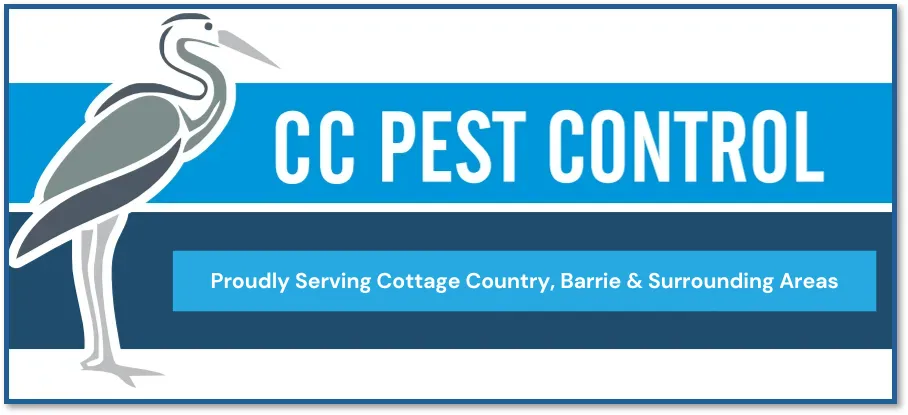
Barrie Pest Journal
Educational insights into how to keep your Barrie home or business pest free

Summer by the Water: Mosquito and Tick Vigilance
Understanding Mosquito and Tick Habitats
Where They Thrive: Mosquitoes and ticks are particularly prevalent near bodies of water. Mosquitoes breed in stagnant water, even in small amounts, such as puddles left after a rainstorm. Ticks, on the other hand, prefer wooded areas and tall grasses, where they can easily hitch a ride on passing wildlife or humans.
Effective Strategies for Control
1. Environmental Management:
Eliminate Standing Water: Regularly check your property for standing water in pots, tarps, and clogged gutters.
Maintain Your Yard: Keep grass mowed and shrubs trimmed. This reduces the habitat for ticks and mosquitoes and makes your yard less inviting to them.
2. Barrier Protection:
Use of Screens: Ensure windows, doors, and porches have tight-fitting screens to keep mosquitoes out.
Personal Protection: Wearing light-colored clothing, long sleeves, and pants tucked into socks can help deter ticks and mosquitoes.
3. Natural Repellents:
Plant-based Options: Consider planting marigolds, citronella, and lavender around your outdoor living areas. These plants are natural deterrents for mosquitoes.
Seasonal Tips and Tricks: Managing Outdoor Spaces to Minimize Pest Risks
Summer is a wonderful time to enjoy the great outdoors, but it also brings its own set of challenges, especially when it comes to mosquitoes and ticks. By taking some proactive steps, you can significantly reduce the presence of these pests and enhance your outdoor experiences. Here are some practical tips for managing your outdoor spaces throughout the summer season:
1. During Wet Conditions:
Eliminate Standing Water: Mosquitoes breed in standing water. Regularly check and empty any containers in your yard like birdbaths, plant saucers, and rain barrels. Keep gutters clean and well-draining to prevent water accumulation.
Maintain Your Yard: Keep your grass cut short and trim bushes and trees. Overgrown vegetation can provide breeding spots for mosquitoes and hiding spots for ticks.
Use Natural Repellents: Consider planting marigolds, lavender, citronella, and other plants that are known to naturally repel mosquitoes. These can make your garden both beautiful and functional.
2. During Heatwaves:
Irrigation Timing: Water your lawn and plants during the early morning hours. This reduces water evaporation and discourages mosquito activity, which tends to be less during cooler parts of the day.
Create Cross-Breezes: If possible, set up fans in outdoor living areas. Mosquitoes are weak flyers, and the air movement can help keep them away.
Opt for Light-Colored Garden Furniture: Mosquitoes are more attracted to dark colors, so choose lighter shades for outdoor decor to deter them.
3. General Summer Long Tips:
Encourage Natural Predators: Install a bat house or attract birds that feed on insects. Bats and certain bird species are natural predators of mosquitoes and can help keep their population down.
Regular Inspections: Check your property regularly for tick habitats, such as leaf litter and tall grasses, particularly along walkways and in shady areas. Keep these areas well-trimmed and apply appropriate tick control treatments if necessary.
Pest-Proof Your Deck: Install fine mesh screens around your patio or deck to create a bug-free zone where you can enjoy summer evenings without the interference of flying pests.
FAQs About Mosquitoes and Ticks: Understanding and Managing These Summer Pests
As the summer season brings us outdoors, mosquitoes and ticks can become a significant concern. Here are answers to some frequently asked questions about these pests to help you stay safe and informed:
How should I check for ticks after being outdoors?
Full Body Check: After spending time in grassy or wooded areas, conduct a full-body check on yourself, your children, and pets. Use a hand-held or full-length mirror to view all parts of your body. Check under the arms, in and around the ears, inside the belly button, the back of the knees, in and around all head and body hair, between the legs, and around the waist.
What are the most effective mosquito and tick repellents?
DEET: Products containing DEET are highly effective against mosquitoes and ticks. A concentration of 20-30% DEET can protect for several hours.
Picaridin: An alternative to DEET, picaridin provides similar protection without the stickiness and with less odor.
Natural Oils: For those preferring natural options, oil of lemon eucalyptus and geraniol have shown effectiveness, but may need more frequent application.
Permethrin: Use permethrin-treated clothing and gear (such as boots, pants, socks, and tents) to repel and kill ticks.
How do I safely remove a tick?
Use Fine-Tipped Tweezers: Grasp the tick as close to the skin's surface as possible. Pull upward with steady, even pressure. Don’t twist or jerk the tick; this can cause the mouth-parts to break off and remain in the skin.
Clean the Area and Your Hands: After removing the tick, thoroughly clean the bite area and your hands with rubbing alcohol, an iodine scrub, or soap and water.
Dispose of the Tick: Submerse the tick in alcohol, place it in a sealed bag/container, wrap it tightly in tape, or flush it down the toilet. Avoid crushing the tick with your fingers.
Can mosquitoes transmit diseases?
Yes: Mosquitoes can transmit several diseases, including Zika virus, West Nile virus, Chikungunya, dengue, and malaria, depending on your geographic location. It's important to use insect repellent and take preventive measures to reduce your risk of mosquito bites.
Are there natural ways to reduce mosquito populations?
Eliminate Standing Water: Mosquitoes breed in standing water. Regularly empty pots, old tires, buckets, and other containers holding stagnant water around your property.
Encourage Natural Predators: Installing bat houses and promoting habitats for birds can help reduce mosquito populations as both bats and certain birds eat mosquitoes.
Cottage Country Pest Control’s Eco-Friendly Solutions
At Cottage Country Pest Control, we take pride in our environmentally responsible approach to Pest Control Barrie. We offer:
Targeted Treatments: Our treatments are designed to target specific areas without widespread spraying of chemicals. This precision helps protect the local wildlife and plant life while effectively reducing mosquito and tick populations.
Biodegradable Products: We use products that are not only effective against pests but also biodegradable, ensuring minimal impact on the environment.
Expert Advice and Continuous Support: Our team is here to help you prepare your property for the summer and provide ongoing support to keep it pest-free.
Why Mosquito and Tick Prevention Matters
Health Risks: Both mosquitoes and ticks can carry diseases. Mosquitoes are known for spreading West Nile Virus, Zika, and other viruses, while ticks can transmit Lyme disease and other serious infections.
Quality of Life: Implementing effective pest control measures enhances your quality of life by reducing the health risks associated with these pests and allowing you to enjoy your summer activities without worry.
Preserving the Beauty of Cottage Country: By controlling these pests, we help maintain the natural beauty and biodiversity of our cherished landscapes.

Schedule a Pest Inspection
Ready to schedule a pest inspection? Contact us today.

Schedule a Termite Inspection
We also provide termite inspections. Schedule yours below.
